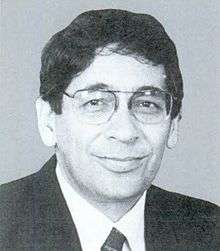Theodore S. Weiss
Theodore S. Weiss (September 17, 1927 – September 14, 1992) was a Democratic member of the United States House of Representatives from New York serving from 1977 until his death from heart failure in New York City in 1992.[1]
Theodore S. Weiss | |
|---|---|
 | |
| Member of the U.S. House of Representatives from New York | |
| In office January 3, 1977 – September 14, 1992 | |
| Preceded by | Bella Abzug |
| Succeeded by | Jerry Nadler |
| Constituency | 20th district (1977–83) 17th district (1983–92) |
| Member of the New York City Council | |
| In office January 1, 1974 – December 31, 1976 | |
| Preceded by | Louis Okin |
| Succeeded by | Ruth Messinger |
| Constituency | 25th district (1962–65) 3rd district (1966–73) 4th district (1974–76) |
| Personal details | |
| Born | September 17, 1927 Gáva, Hungary |
| Died | September 14, 1992 (aged 64) New York City, United States |
| Political party | Democratic |
| Military service | |
| Allegiance | United States of America |
| Branch/service | United States Army |
| Years of service | 1946 – 1947 |
Life and career
Weiss was born in Gáva, Hungary and emigrated to the United States in 1938. He grew up in Perth Amboy, New Jersey. Weiss served in the United States Army from 1946 until 1947. He graduated from Syracuse University in 1951, earning a law degree from Syracuse University College of Law in 1952. In 1953, Weiss became a naturalized citizen of the United States. Between 1955 and 1959, he was an assistant New York County District Attorney, before leaving the position to return to private practice.[1]

From 1962 until 1976, Weiss was a member of the New York City Council. He was a delegate to the 1972 Democratic National Convention. Weiss was elected to Congress in 1976, representing most of Manhattan's West Side, and served from January 3, 1977, until his death. Weiss was known for his avid support of liberal causes, including civil rights, open government, and the arts. He served on the House Committee on Banking, Finance, and Urban Affairs, the House Committee on Government Operationsl, and the House Committee on Foreign Affairs. In 1985 Weiss headed a committee that found 90 percent of the twenty to thirty thousand new drugs used on farm animals had not been approved by the FDA in violation of the Federal Food, Drug, and Cosmetic Act. They also found that the U.S. Food and Drug Administration (FDA) failed to remove several drugs already known to be Carcinogens.[1]
Weiss died three days before the state's Democratic primary election which would have also been the date of his sixty-fifth birthday. Due to the Congressman's ailing health, five Democrats appeared on the ballot to challenge him. Nonetheless, Weiss posthumously won the primary by a huge margin. State Assemblyman Jerry Nadler was named to replace Weiss on the ballot and was handily elected in November; Nadler still holds the seat.[1]
The Ted Weiss Federal Building in Lower Manhattan, adjacent to the African Burial Ground National Monument, has been named in Weiss' honor.
See also
- List of Jewish members of the United States Congress
- List of United States Congress members who died in office (1950–99)
References
- Dao, James (September 15, 1992). "Rep. Ted Weiss, 64, Dies; Liberal Stalwart in House". The New York Times. p. D22.
Sources
- United States Congress. "Theodore S. Weiss (id: W000258)". Biographical Directory of the United States Congress.
- Appearances on C-SPAN
| Political offices | ||
|---|---|---|
| Preceded by Louis Okin |
New York City Council, 25th District 1962–1965 |
Succeeded by Julius Moskowitz |
| Preceded by Newly created district |
New York City Council, 3rd District 1966–1973 |
Succeeded by Miriam Friedlander |
| Preceded by Carter Burden |
New York City Council, 4th District 1974–1976 |
Succeeded by Ruth Messinger |
| U.S. House of Representatives | ||
| Preceded by Bella Abzug |
Member of the U.S. House of Representatives from New York's 20th congressional district 1977–1983 |
Succeeded by Richard Ottinger |
| Preceded by Guy V. Molinari |
Member of the U.S. House of Representatives from New York's 17th congressional district 1983–1992 |
Succeeded by Jerrold Nadler |